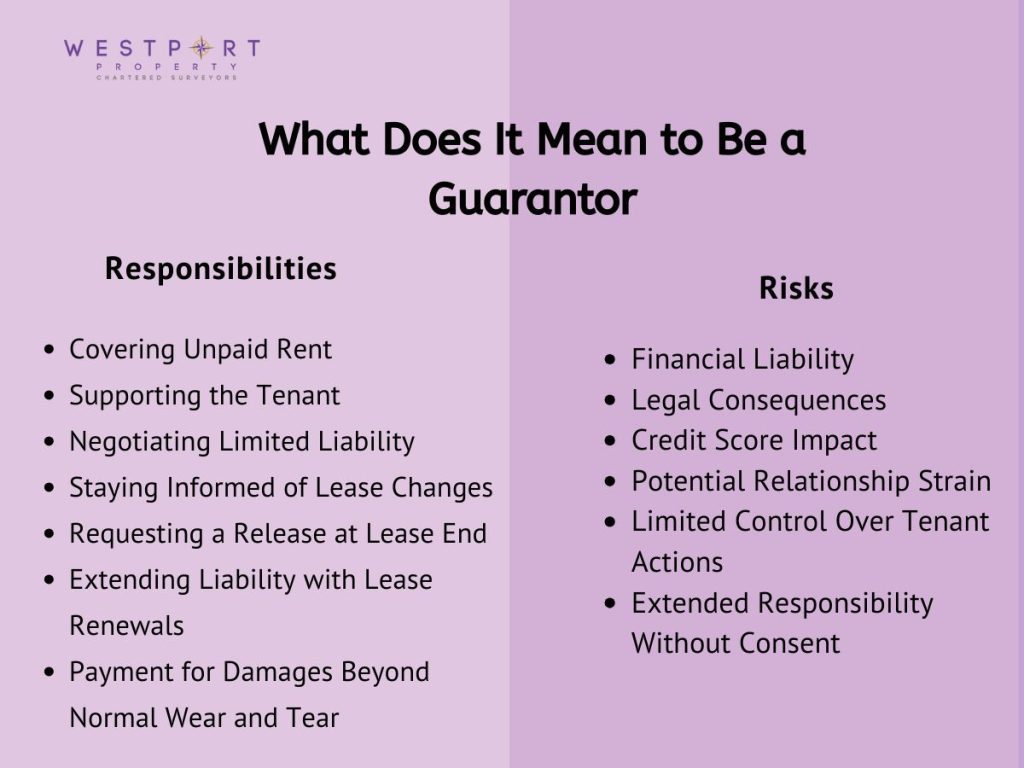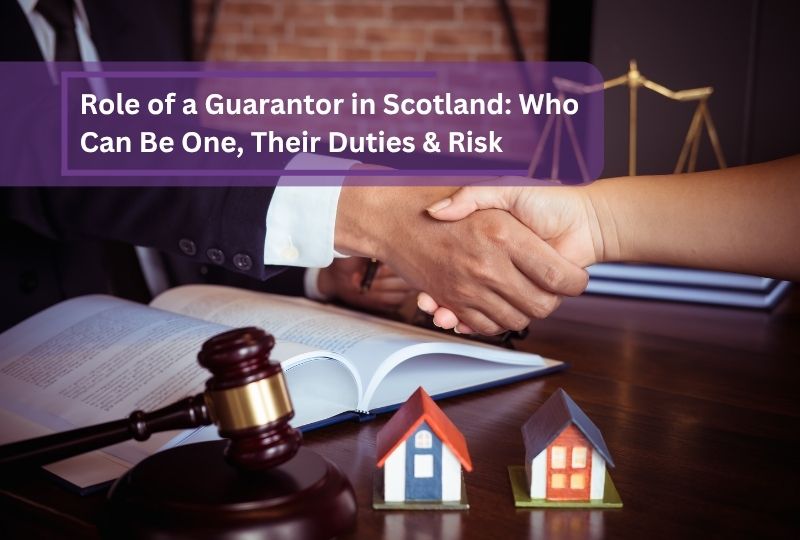Considering becoming a rental guarantor in Scotland? Being a guarantor is a significant responsibility, often undertaken by family or friends to assist someone in securing a rental property. This comprehensive guide will help you understand what it means to be a guarantor, the requirements involved, the potential risks, and more.
What is a Rental Guarantor?

A rental guarantor is someone who agrees to take financial responsibility for a tenant’s rent payments and other rental obligations if the tenant is unable to meet them. Typically, a guarantor can be a parent, close relative, or trusted individual. Their role is to ensure that rent payments are made if the tenant falls into arrears or defaults on the tenancy agreement. This provides security for the landlord, knowing they have financial backing if the tenant doesn’t fulfill their obligations.
For tenants, having a guarantor offers peace of mind, as they can rely on the guarantor to cover any missed payments, avoiding the need to borrow or take out loans. However, this arrangement requires a significant level of trust, as the guarantor is legally bound to cover the costs. If the tenant fails to pay, the landlord can ask the guarantor to settle the debt. If the guarantor doesn’t pay, the landlord has the right to take legal action.
Types of guarantor agreement in Scotland:
In Scotland, there are two main types of guarantor agreements, each with distinct features and implications for both landlords and tenants:
- Fixed-term Agreements: These agreements are tied to a specific lease period, such as six or twelve months. The guarantor is responsible for covering any unpaid rent or damages during this defined period. Once the lease ends, the guarantor’s obligations generally expire unless the agreement is renewed or extended.
- Open-ended Agreements: Unlike fixed-term agreements, open-ended guarantor agreements do not have a set end date and continue until the tenancy is formally concluded. These agreements remain in place even if the lease is extended or renewed, meaning the guarantor’s obligations persist for the entire duration of the tenancy, regardless of any changes in the lease’s term.
When Do You Need a Guarantor to Rent in Scotland?
In Scotland, a rental guarantor is often required to provide additional security for landlords, ensuring that the landlord is financially protected if the tenant fails to meet their financial obligations. Here are some common scenarios where a rental guarantor might be necessary:
- First-Time Renters
First-time renters, especially young individuals or students, may lack a solid rental history or a strong credit record. In such cases, landlords may request a guarantor to mitigate the risk of renting to someone with no proven track record. - Tenants with Poor or Limited Credit History
If a tenant has a poor or limited credit history, landlords may have concerns about the tenant’s ability to pay rent regularly. A guarantor with a strong credit history provides reassurance that the rent will be paid on time, regardless of the tenant’s financial situation. - Students
In Scotland, many students are required to provide a guarantor, as they often lack a consistent income or credit history. Typically, parents or guardians step in as guarantors to support the student’s rental application.
Also Read: Can Non Students Live in Student Accommodation? - New Immigrants or Expats
New arrivals to the UK, particularly those without a local credit history, may be asked to provide a guarantor. This is particularly common for individuals moving to Scotland for work or study, as they may not yet have established their financial credibility in the country. - Tenants with Low or Unstable Income
Tenants with inconsistent or low incomes, such as self-employed individuals or those on zero-hour contracts, may find it more difficult to secure a rental property without the backing of a guarantor. Landlords may require additional assurance that the rent will be paid regularly. - Renting High-Value Properties
For higher-value rental properties, landlords may request a guarantor as an added layer of protection, regardless of the tenant’s financial status. Similarly, in loans and mortgages, guarantors provide an extra level of security to ensure repayment. This ensures that the landlord is compensated for any unpaid rent or potential property damage.
Who Can be a Guarantor for Renting in Scotland, UK?

Guarantors can often be people you have a close relationship with, such as parents, guardians, or trusted friends. However, they don’t always have to be one. In some situations, colleagues or even employers may serve as guarantors if they meet the necessary criteria. Typically, guarantors must be UK residents, property owners, and often relatives or close acquaintances of the tenant.
To qualify as a guarantor in Scotland, you must meet the following criteria to be eligible:
- Minimum Age Requirement
Generally, you must be at least 18 years old to act as a guarantor, ensuring you are legally eligible to enter into a binding financial agreement. - Financial Stability
Landlords seek financially stable guarantors who can reliably cover the tenant’s rent if the tenant fails to pay. This typically means having a steady income or assets that demonstrate your financial capacity to meet any obligations. - Good Credit History
A solid credit history is typically required, as it reflects responsible financial management. A good credit score can provide reassurance to landlords that you are capable of covering costs if necessary. - Residency in the UK
Being a resident of the UK, particularly in Scotland, simplifies the legal and financial processes involved. It also makes it easier for landlords to assess your financial standing and reach you if needed. - Full Understanding of Responsibilities
Before agreeing, it’s essential to fully understand the obligations and risks involved. Being a guarantor is a serious commitment, legally binding you to cover unpaid rent or damages on behalf of the tenant if required.
What Documents Does a Guarantor Need to Provide in Scotland?

Download Guarantor Requirements Checklist - Scotland, UK PDF file
If you’re considering becoming a guarantor, landlords typically require the following documents to verify your eligibility:
1. Personal Information
- Full name and contact details
- Date of birth
- Current and previous addresses (if applicable)
2. Proof of Identity
- A government-issued ID (passport, driver’s license, or national ID card)
- Proof of nationality or residency status
3. Proof of Income
- Recent pay slips (usually for the last 3 months)
- Bank statements (for the last 3 months)
- Tax returns or other income verification (if self-employed)
4. Credit Check
Landlords or letting agents may conduct a credit check to evaluate your financial health and credit history. A positive credit record signals your reliability and ability to meet financial obligations, which is crucial for a guarantor.
5. Proof of Address
A recent utility bill or bank statement to verify your current address and residency status. This document ensures the landlord can contact you if needed.
6. Employment Details
- Employer’s contact details
- Proof of employment or contract (if applicable)
7. References
A character reference (sometimes required to confirm reliability)
Additional Requirements:
- Must be a UK resident
- Typically needs to be over 21 (sometimes 25, depending on the agreement)
- Needs to earn a minimum annual income (often around 3 times the annual rent)
- Should have a good credit history
These documents are necessary to confirm that the guarantor meets the requirements and can provide the necessary support if the tenant defaults on their rental obligations.
Also Read Our Blog: Essential Documents You Need to Rent a Property in the UK (Scotland)
What Does It Mean to Be a Guarantor: Responsibilities and Risks
Being a guarantor is a significant commitment, offering financial assurance for a tenant in the rental process. Below, we’ve outlined the main responsibilities and risks associated with being a guarantor in Scotland’s rental market.

Responsibilities of a Guarantor
- Covering Unpaid Rent
One of the primary roles of a guarantor is to ensure rent is paid if the tenant fails to make timely payments. The guarantor is legally obligated to cover any outstanding rent, and this responsibility typically extends for the entire lease term.
- Payment for Damages Beyond Normal Wear and Tear
Normal wear and tear on a rental property is expected, but tenants may sometimes cause damage beyond this. As a guarantor, you may be liable for covering the cost of repairs or replacements for damaged items that the tenant cannot afford. This could include repairing broken fixtures or replacing damaged appliances.
- Extending Liability with Lease Renewals
Some guarantor agreements extend automatically if the tenant renews their lease. This means your commitment may continue without the need for a new contract. It’s important to confirm whether your guarantee covers only the initial lease term or if it extends to subsequent renewals.
- Supporting the Tenant
Guarantors often support tenants financially or offer budgeting advice, particularly for first-time renters who may need assistance managing their finances.
- Negotiating Limited Liability
Some agreements allow you to set limits on your liability, covering only unpaid rent or specifying a maximum amount to limit your personal risk. Always clarify this before agreeing to act as a guarantor.
- Staying Informed of Lease Changes
Any changes to the lease, such as subletting or roommate alterations, could affect your liability. Ensure that you are kept informed of any amendments to the lease agreement.
- Requesting a Release at Lease End
Once the lease ends, you can request to be released from your guarantor duties, particularly if the tenant has consistently maintained a good payment record.
Risks of Being a Guarantor
- Financial Liability
As a guarantor, you are financially responsible for unpaid rent and potential damages. If the tenant defaults, you could face considerable financial strain, which could impact your savings or other assets.
- Legal Consequences
If you are unable to meet your obligations as a guarantor, the landlord or lender could take legal action to recover unpaid debts. This may include court proceedings, and failure to pay could result in a judgment against you.
- Credit Score Impact
Fulfilling guarantor obligations may impact your credit score, particularly if payments are missed. This can affect your ability to secure loans or lines of credit in the future.
- Extended Responsibility Without Consent
In cases where the tenant renews the lease, you may be liable beyond the initial term, even if you did not agree to an extension. This could extend your financial obligations without your explicit consent.
- Potential Relationship Strain
A guarantor for friends or family members can strain relationships if payment issues arise, as financial disputes often lead to personal conflicts, particularly when the guarantor and applicant are close.
- Limited Control Over Tenant Actions
As a guarantor, you have no direct control over the tenant’s actions or financial habits, even though you are financially responsible. This lack of control can create risks if the tenant is unreliable.
How to Protect Yourself as a Guarantor

Before agreeing to be a guarantor, consider these protective steps:
- Read the Lease and Guarantor Agreement Carefully: Fully understand every term, including the length of your commitment and the responsibilities you are undertaking.
- Set Limits in the Agreement: Some landlords allow you to limit your liability to a certain amount or period, protecting you from indefinite obligations.
- Request Updates on Rent Payments: Stay informed by requesting regular updates or access to payment records, ensuring you are aware of any payment issues early on.
- Ensure Transparency with the Tenant: Open communication with the tenant is essential. This will help prevent unexpected surprises and allow you to address any issues before they escalate.
Ending a Guarantor Agreement
Ending a guarantor agreement in Scotland can sometimes be complex, and it typically depends on the specific terms outlined in the agreement. Here are a few scenarios to consider:
- Lease Expiration: In most cases, the guarantor’s responsibilities end when the lease term concludes. Once the tenant moves out and the lease is officially terminated, the guarantor is no longer liable for any unpaid rent or damage caused during the tenancy.
- Tenant Replacement: If the tenant finds a new guarantor, the original guarantor may be released from their obligations. However, this is subject to the landlord’s approval and any conditions specified in the original agreement. The landlord must assess the new guarantor’s eligibility before releasing the original party from their commitments.
- Formal Release Request: Some landlords may allow a guarantor to exit the agreement early if they provide sufficient notice, and the tenant can secure a replacement guarantor. However, this is not always guaranteed and often depends on the landlord’s policies and whether the tenant meets the necessary criteria for a new guarantor.
Common Types of Guarantor Agreements in Scotland

In Scotland, there are two main types of guarantor agreements, each with distinct features and implications for both landlords and tenants:
- Fixed-term Agreements:
These agreements are tied to a specific lease period, such as six or twelve months. The guarantor is responsible for covering any unpaid rent or damages during this defined period. Once the lease ends, the guarantor’s obligations generally expire unless the agreement is renewed or extended. - Open-ended Agreements:
Unlike fixed-term agreements, open-ended guarantor agreements do not have a set end date and continue until the tenancy is formally concluded. These agreements remain in place even if the lease is extended or renewed, meaning the guarantor’s obligations persist for the entire duration of the tenancy, regardless of any changes in the lease’s term.
Key Considerations Before Becoming a Guarantor
If you’re considering becoming a guarantor in Scotland, it’s essential to thoroughly evaluate the following factors:
- Understand All Terms:
Carefully review the terms in the guarantor agreement, especially those related to rent payments, potential damage costs, and any clauses about lease extensions or renewals. - Evaluate Your Financial Position:
Assess your own financial situation to determine whether you are in a stable position to cover potential liabilities. Make sure you are comfortable with the possibility of having to pay any overdue rent or repair costs. - Open Communication:
Discuss the tenant’s financial stability and ensure they understand the importance of meeting their rental obligations. A conversation about expectations and responsibilities can help prevent surprises later. - Seek Legal Advice:
If you are unsure about any aspect of the guarantor agreement or need clarity on your responsibilities, it’s wise to consult a legal professional. They can help you understand the terms and assess whether you should proceed.
Alternative Options for Tenants Who Need a Guarantor
If you’re hesitant to become a guarantor, there are alternative solutions available for tenants:
- Insurance-Based Rent Guarantor Services:
Companies such as Housing Hand or Guarantor Services UK offer rent guarantor services for a fee. These services step in as the guarantor, relieving family or friends from the responsibility. - Joint Tenancy with Friends or Family:
Tenants may consider entering into a joint tenancy agreement with family members or friends, reducing or eliminating the need for a separate guarantor. This option spreads the responsibility across multiple tenants. - Saving for a Higher Deposit:
Some landlords accept a larger security deposit in place of a guarantor. This offers additional security in case the tenant defaults on rent payments, and it may be a preferred option for some landlords.
Conclusion: Should You Be a Guarantor?
Becoming a rental guarantor is a significant commitment, especially in Scotland, where legal implications are binding and enforceable. It’s essential to weigh the potential risks against the rewards. Always communicate with the tenant about their financial stability, review the guarantor agreement thoroughly, and consider seeking legal advice if you’re unsure about the obligations.
Being a rental guarantor can be a rewarding way to support someone, but it requires a full understanding of the risks involved. By following this guide, you can make an informed decision and, if you choose to proceed, ensure that clear terms are established to protect your interests throughout the tenancy.
Need more guidance on guarantor responsibilities or rental options? Westport Property is here to help. Reach out to explore your options and get expert advice tailored to the Scottish rental market.
Have A Question or Need Some Help?
Whether you're searching for the perfect rental property or a landlord wanting advice on letting, we're here to assist. Feel free to call our office or send us an email, and we'll be happy to help you with any queries you may have.
FAQ
Can I limit my financial liability as a guarantor in Scotland?
Yes, you can negotiate terms such as capping liability to a specific amount or limiting the duration of your responsibility. Ensure these terms are clearly outlined in the agreement before you sign.
Can I stop being a guarantor if I no longer wish to carry the obligation?
It depends on the terms of the agreement. Fixed-term agreements often end with the lease, while open-ended agreements may require the tenant to find a replacement guarantor before you’re released.
How much do you need to earn to be a guarantor?
The exact income required to be a guarantor varies depending on the landlord or letting agency. However, a common requirement is that the guarantor earns at least 3–4 times the annual rent of the property. Some landlords may also consider savings or other assets if income alone does not meet their requirements. Always check the specific terms with the landlord or agency involved.
Can a old person be a guarantor?
Yes, an older person can be a guarantor as long as they meet the necessary criteria. Typically, they should be a UK resident, have a stable income or sufficient savings, and, in many cases, own property. Age itself is not a barrier, but their financial stability and ability to cover the tenant’s rent if needed are key considerations.



 Find a Property Sale/Rent
Find a Property Sale/Rent  Letting Agents
Letting Agents  Asset Management
Asset Management 






